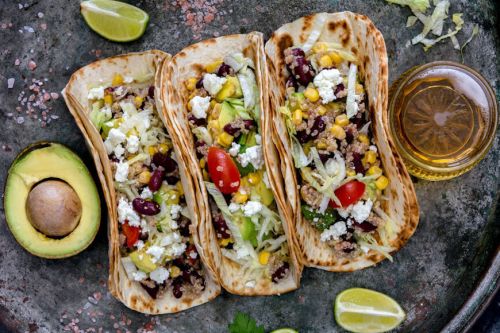Our editors independently select these products. Making a purchase through our links may earn Well+Good a commission
As plant-based eating continues to take off, Mexican cuisine returns to its vegan roots
Mexican food is going back to its vegan, plant-based roots both in grocery stores and in the restaurant space; here's why it's important.

As we know it in the U.S., Mexican food typically involves lots of meat and cheese—enchiladas stuffed with beef, chicken tinga tacos, nachos topped with sour cream and cheese. Delicious? Absolutely. But not necessarily the first type of cuisine many would think of when considering a plant-based diet.
But according to vegan food activist and Food Empowerment Project founder Lauren Ornelas, Mexican food was traditionally entirely plant-based. “It’s really important to realize the effects colonization had on our diets,” she says. “Our indigenous ancestors didn’t drink milk or consume dairy, and they weren’t necessarily vegan, but they didn’t eat as much animal products as is in our diets now.” She says that that the fundamental components of Mexican food have always been vegetables (with a major emphasis on corn and tomatoes), legumes, and fruit.
Now that plant-based eating has exploded across the board, Mexican cuisine seems poised to return to its roots. All it takes is a lap around the grocery store to see that there are more vegan options available than ever before—Mexican food included. The demand has led to products such as Beyond Meat’s “beef” taco crumbles, Siete Foods cashew-based queso, and Upton’s Naturals’ chili lime jackfruit. There are also more vegan Mexican restaurants than before, too: Eateries such as Mi Vegana Madre in Arizona, El Papagayo in California, and Charly’s Vegan Tacos in Texas, are just a few examples of how the Mexican food space is changing outside of the supermarket.
But Ornelas says that beyond products, there are other factors at play that make it harder for people to embrace plant-based Mexican food. “Not everybody has access to healthy food,” Ornelas says, referencing the 13.5 million Americans living in a food desert. Hispanic American neighborhoods have fewer chain supermarkets and grocery stores than white neighborhoods after adjusting for income level of the neighborhoods. “It goes back to having access to fruits and vegetables, like fresh tomatoes instead of tomato paste bought from the nearby liquor store, which is where many do their food shopping. We’re lucky that beans and rice—two Mexican staples—are inexpensive and typically accessible, but it’s important to have produce, too.”
“It can be a big hurdle to convince someone that they can make their grandmother’s recipe with substitutes for meat and cheese and it can still be delicious.” —Dora Stone, cookbook author and founder of Dora’s Table
It’s a mission the Food Empowerment Project is devoted to (via focus group research and lobbying efforts) and a cause others are recognizing as well. In Phoenix, Arizona, The Farm Express brings the produce aisle to people without access and accepts EBT cards. In Denver, Colorado, healthy food activists Eric Kornacki and Joseph Teipel recognized the lack of access to fruits and vegetables in the Westwood neighborhood, which is 81 percent Latino, and launched Re:Vision, an initiative that helps residents grow their own backyard gardens. The group is working toward opening a full-service grocery store for that neighborhood.
Another challenge is education. Dora’s Table founder and cookbook author Dora Stone (who was born and raised in Mexico, is vegan, and is a graduate of the Culinary Institute of America), says that so many Mexicans and Mexican-Americans have become accustomed to meat being the center of the plate that the shift back to a plant-forward diet can take some education and experimentation with the right vegan substitutes.
“It can be a big hurdle to convince someone that they can make their grandmother’s recipe with substitutes for meat and cheese and it can still be delicious,” Stone says. But she adds that the growing trend has made people who would have been hesitant to try vegan Mexican food realize it can still taste delicious. Just skim her site and you can see some of the creative ways she has reworked traditional foods to be plant-based, from vegan chorizo and caldo de albondigas (meatball soup) to enchiladas and tamales with vegetable fillings.
Stone adds that while the new innovative food products on the market are great (and making vegan Mexican cooking easier for many), there are ways to make healthy, plant-based food without them. “To me, the basis [of Mexican cuisine] has always been corn, tomatoes, and beans,” she says. “The indigenous people of Mexico did eat a little bit of game and fish, but it was the Spanish that brought over cows and pigs, so really all it takes to cook more vegan Mexican food is to get back to those basics.”
When looked at collectively—the growing number of vegan Mexican restaurants, food products, and more importantly, dialogue about plant-based Mexican food—it’s clear that a healthy change is coming for many eaters’ plates. Sometimes, going back to basics really does pay off.
If you’re looking for some healthy Mexican recipes, try these keto-approved cauliflower enchiladas and these low-carb burritos.
Sign Up for Our Daily Newsletter
Get all the latest in wellness, trends, food, fitness, beauty, and more delivered right to your inbox.
Got it, you've been added to our email list.










